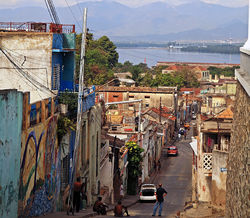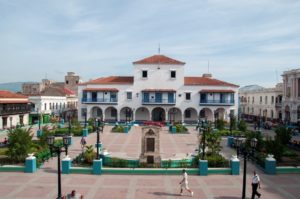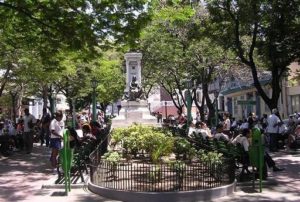To talk with my grandfather, in those moments when his agitated way of life lived with him then with his 87 years in tow. (He died last year).
He always spoke of the curious, sad and joyful things that he lived or witnessed in the pre-1959 Santiago. He remembered sites that are no longer or are not what they were, such as the “famous” Farmacia Lorenzo, where he worked as a courier from very early to become a sales clerk and was in front of the Clinic of “Los Angeles”, now renamed uselessly with Another name, just where today another pharmacy continues in the alchemy of medicines and pharmacological preparations.
He also told me about events that took place in Santiago; Of his life and of curious characters of the city. Today I start with one of those characters The Cavalier Roberto better known as “Pisa Bonito”, from the memory of my grandfather.
He recounts that in the second half of the thirties or forties of the last century (sometimes the years are confused when he has lived so long), he was walking the streets of Santiago El Caballero Roberto, a Negro about 50 or 60 years old , By profession barber. The knight was given for several reasons; The first of them his exquisite dress, always “neck and tie”, wearing a black-blue suit, white shirt and straw hat, keeping a clean impeccable at all costs. Another reason for his appellation was his extreme education, respect and gallantry towards those he was dealing with, an aspect that coincided with all those who, at one time or another, crossed words with him.
His chivalry came to such an extent that when he confronted any woman on the sidewalk, he immediately went down to the street and took his hat bowed, while giving the woman phrases such as: “Pass you beautiful lady and God the Keep forever! ”
The only thing that stood out in his print were the black shoes, numbers larger than the one that would correspond to his foot. In fact, this lackluster was due to the fact that he tried to counteract some bunions that provoked in this man a characteristic walk: leaning forward the knees and dragging the steps a little, Which earned him the nickname “Pretty Pisa”, and they tell, that he only looked annoyed when they called him by this motto.
The circuit of the floors of “pretty Pisa” was relatively short: from the Park of Céspedes to the Park Dolores and, in the majority of the opportunities, from Dolores to the Square of Mars, always with its typical walk, wishing politely to the Bystanders.
My grandfather was joking that in one of these usual walks the black knight of the bunions met a trusted friend whom he had not seen for a long time and after the routine greetings he inquired for the wife of his interlocutor, the Who, on being told that his wife had died several days before, was astonished to hear the phrase that, from the lips of the barber, shot out into the anecdotal:
– “Don’t fuck the old woman died!”
When my grandfather told me this, amidst laughter from both sides, I always received from my grandmother that this was impossible, as the story came, from a person as fine and a gentleman as “Pisa Bonito” was. I’ll tell you as my grandfather told me and so I tell you.
Personajes de mi viejo Santiago: El Caballero Roberto “Pisa Bonito”.
Conversar con mi abuelo, en esos momentos en que su agitada forma de vivir la vida le acompañaba entonces con sus 87 años a cuestas.(Murió el año pasado).
El hablaba siempre de las cosas curiosas, tristes y alegres, que vivió o de las que fue testigo, en el Santiago pre-1959. Recordaba sitios que ya no están o no son lo que fueron, como la “famosa” Farmacia Lorenzo, donde trabajó de mensajero desde muy temprano hasta hacerse vendedor de mostrador y que quedaba frente a la Clínica de “Los Ángeles”, hoy rebautizada inútilmente con otro nombre, justo donde hoy otra farmacia continúa en la alquimia de los medicamentos y preparados farmacológicos.
El me hablaba también de sucesos que tuvieron lugar en Santiago; de su vida y de personajes curiosos de la ciudad. Hoy comienzo con uno de esos personajes El Caballero Roberto mas conocido como “Pisa Bonito”, desde el recuerdo de mi abuelo.
Cuenta que allá por la segunda mitad de la década del treinta o cuarenta del pasado siglo (a veces los años se confunden cuando tanto se ha vivido), recorría las calles de Santiago El Caballero Roberto, un negro de unos 50 o 60 años de edad, de profesión barbero. Lo de caballero le era dado por varios motivos; el primero de ellos su exquisitez en el vestir, siempre de “cuello y corbata”, usando un traje negro-azul, camisa blanca y sombrero de pajilla, manteniendo a ultranza una limpieza impecable. Otra de las razones de su apelativo, era su extrema educación, respeto y galantería para con los que trataba, aspecto que coincidían destacar todos los que en una u otra oportunidad, cruzaban palabras con él.
A tanto llegaba su caballerosidad que, al enfrentarse sobre la acera a cualquier mujer, bajaba inmediatamente a la calle y quitándose el sombrero hacía una reverencia, a la vez que regalaba a la fémina frases como: “¡Pase usted bella dama y que Dios la conserve para siempre así!”.
Lo único que desentonaba en su estampa eran los zapatos negros, unos números más grande que el que correspondería a su pie. En realidad este desentono se debía a que trataba de contrarrestar unos juanetes que provocaban en este señor un caminar característico: inclinando hacia delante las rodillas y arrastrando un poco los pasos; lo que le ganó el apodo de “Pisa bonito”, y cuentan, que sólo se le veía molesto cuando lo llamaban por este mote.
El circuito de los andares de “Pisa bonito” era relativamente corto: desde el Parque de Céspedes hasta el Parque Dolores y, en la mayoría de las oportunidades, desde Dolores hasta la Plaza de Marte, siempre con su andar típico, saludando cortésmente a los transeúntes.
Contaba jocoso mi abuelo que en uno de estos acostumbrados paseos, el caballero negro de los juanetes se encontró con un amigo de confianza al que no veía desde hacía un buen tiempo y luego de los saludos de rutina inquirió por la esposa de su interlocutor, el cual, al comentarle que su señora esposa había fallecido días atrás, quedó estupefacto al escuchar la frase que, de los labios del barbero, salió disparada hacia lo anecdótico:
-“¡No joda que se murió la vieja!”
Cuando mi abuelo me contaba esto, entre risas de ambas partes, siempre recibía como respuesta de mi abuela que eso era imposible viniendo, como venía la historia, de una persona tan fina y caballerosa como “Pisa Bonito”. Se los cuento tal como me lo contó mi abuelo y asi se los cuento a ustedes.
Agencies/Santiago en Mi/Noel Pérez García/Internet Photos/ Arnoldo Varona/ TheCubanHistory.com
THE CUBAN HISTORY, HOLLYWOOD.











